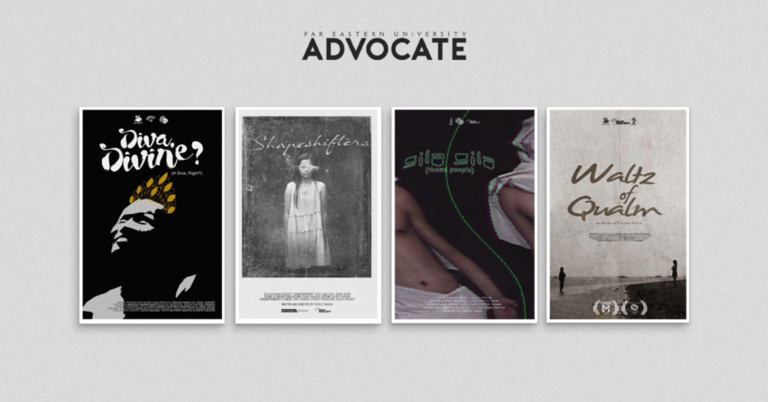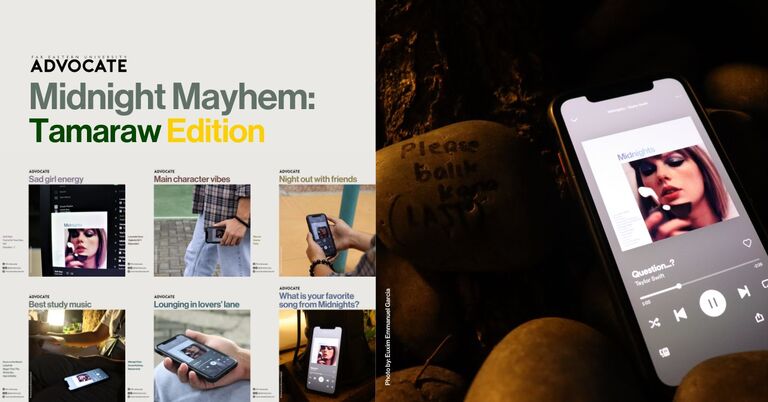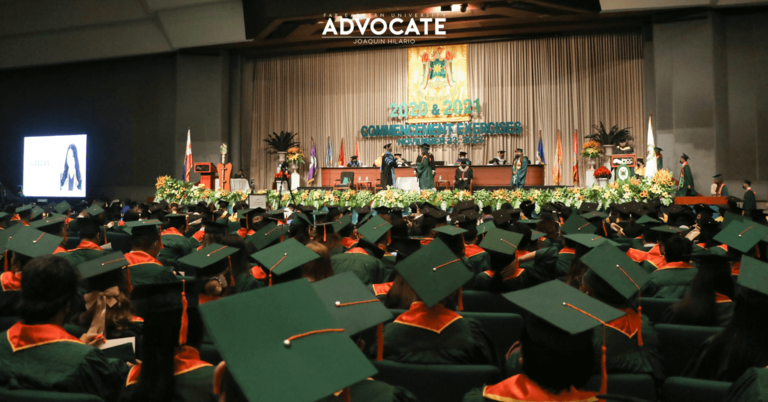
FEU opens season 85 campaign with tight loss against AdMU
- October 02, 2022 12:02
FEU Advocate
March 03, 2022 02:55

by Antonio Luis A. Carreon and John Vincent Cruz
Far Eastern University (FEU) Communication students' films were among the 14th Cinema Rehiyon’s selection for its regional film festival announced last February 7, in celebration of National Arts Month in Davao City.
With the theme 'Sining ng Pag-Asa,' this year's National Arts Month recognizes art in the creative expression of hope in the middle of chaos, such as the COVID-19 pandemic, natural calamities, and social realities.
Among the pool of 200 films, four films were selected from FEU directed by Francisco Tavas III and John Patrick Pangan.
A visionary driven by justice
Tackling extrajudicial killings (EJKs) through the use of Philippine folklore, "Shapeshifters" seeks to showcase the dangerous upshot of the brutal murders of innocent lives amidst Duterte's administration.
In an interview with FEU Advocate, Pangan shared the inspiration behind the film.
"I wanted to tell stories to revolve around folk and mythological beliefs, that's where all ideas started, and eventually, I connected it with extrajudicial killings, and it continued from that," he said.
Pangan mentioned that the film is a call to the current administration to be accountable for the psychosocial and economic damage of the unjust killings.
The first draft of the film's script was conceived around the time when social issues such as the EJKs were still prevalent despite the pandemic.
Pangan utilized surrealism as the film's style—evident throughout its elements, adding that the mix of reality and fantasy allowed him to be unrestrained in telling the story.
"Hindi ako narerestrict since maraming odd o baliw na elements na pwede kong mainput doon sa film which could give a different perspective sa viewers (I wasn't restricted since there were many odd and crazy elements that I was able to input in the film, which could give a different perspective on viewers),” he added.
Set in Pangasinan, the film's production process was completed in less than two weeks. Among the notable challenges he cited was the lack of manpower, financial resources, and mobility restrictions brought by the COVID-19 pandemic.
Further, Pangan said that the film's need for visual effects and animation was a challenge due to the film's 'surrealist elements' to meet the folklore and myth aspects of the film.
However, he noted that the isolation helped him reassess and observe his surroundings, which ultimately inspired the film's gist.
Marginalized groups in film
Student filmmaker Tavas had three of his projects featured in the prestigious film fest— "Sila-Sila”, "Diva, Divine”, and "Waltz of Qualm." Notably, these explore the concept of gender and sexuality and the social constructs surrounding them.
In Sila-Sila, he shared that it was his first-ever experimental project and did not want to give away any information as he wanted the audience to have their own interpretation of the film.
"This kind of film is meant for the audiences to decipher on their own. Thus, I won't give so much detail," he said.
The film came to fruition in just a month, adding that it was challenging for him to come up with the concept.
Additionally, Tavas shared that he was not in the best state while doing the project since the concept was not polished.
Regardless, the young filmmaker cited his team's perseverance as his driving force in completing the films.
Tavas' second film, 'Diva, Divine,' embarks on the daily life and survival of a comedic entertainer and pre-pandemic beauconera (beauty pageant contestant) on the process of disclosing herself as part of the Lesbian, Gay, Bisexual, Transgender, Queer, Intersex, Asexual plus (LGBTQIA+) Community.
Two months in the making, Tavas said that they had to dedicate their time researching the life of their protagonist, Angelica Mapanganib.
"I was nervous at first since this is my first time making a documentary film. However, my production members and close friends have given their assistance wholeheartedly. With this, we were able to make this film without much of a challenge," he added.
The third film, ‘Waltz of Qualm,’ explores the concept of self-acceptance of one's identity and sexuality, as it explains how "one cannot escape truth and reality—no matter how hard they try to conceal or run away from it."
Along with the heavy rain and equipment issues, this marked the first time Tavas made a film without any script at hand, and most of the scenes were driven by spontaneity and out-of-the-spur moments.
"I feel like I will continue attempting to make films without scripts because I have enjoyed the entire process. We only have actors and a camera with us. I have concluded that collaboration is indeed a key factor in film production," Tavas shared.
Unwavering passion
With three films selected for the event, Tavas shared that perseverance and love for the film were the prime factors to overcoming the challenges surrounding his production experience.
"I have been making films since 2017. Since then, my love for it only grew stronger, and I've learned so much throughout those years. The knowledge and love that I have was really instrumental and has urged me to go on," he said.
As for Pangan, he hopes that the film would touch the hearts of its audience, particularly the youth, to make a move when faced with societal issues.
"This is an ode to the youth, especially to myself who once grew with such ignorance [to social issues] and slowly discovered the truth. Through these little steps, we can initiate change and be part of that change," Pangan said.
The 14th iteration of the National Commission for Culture and Arts (NCCA) National Committee on Cinema's flagship project, Cinema Rehiyon, is held from February 26 to March 31.
(Photo courtesy of Francisco Tavas III and John Patrick Pangan)









